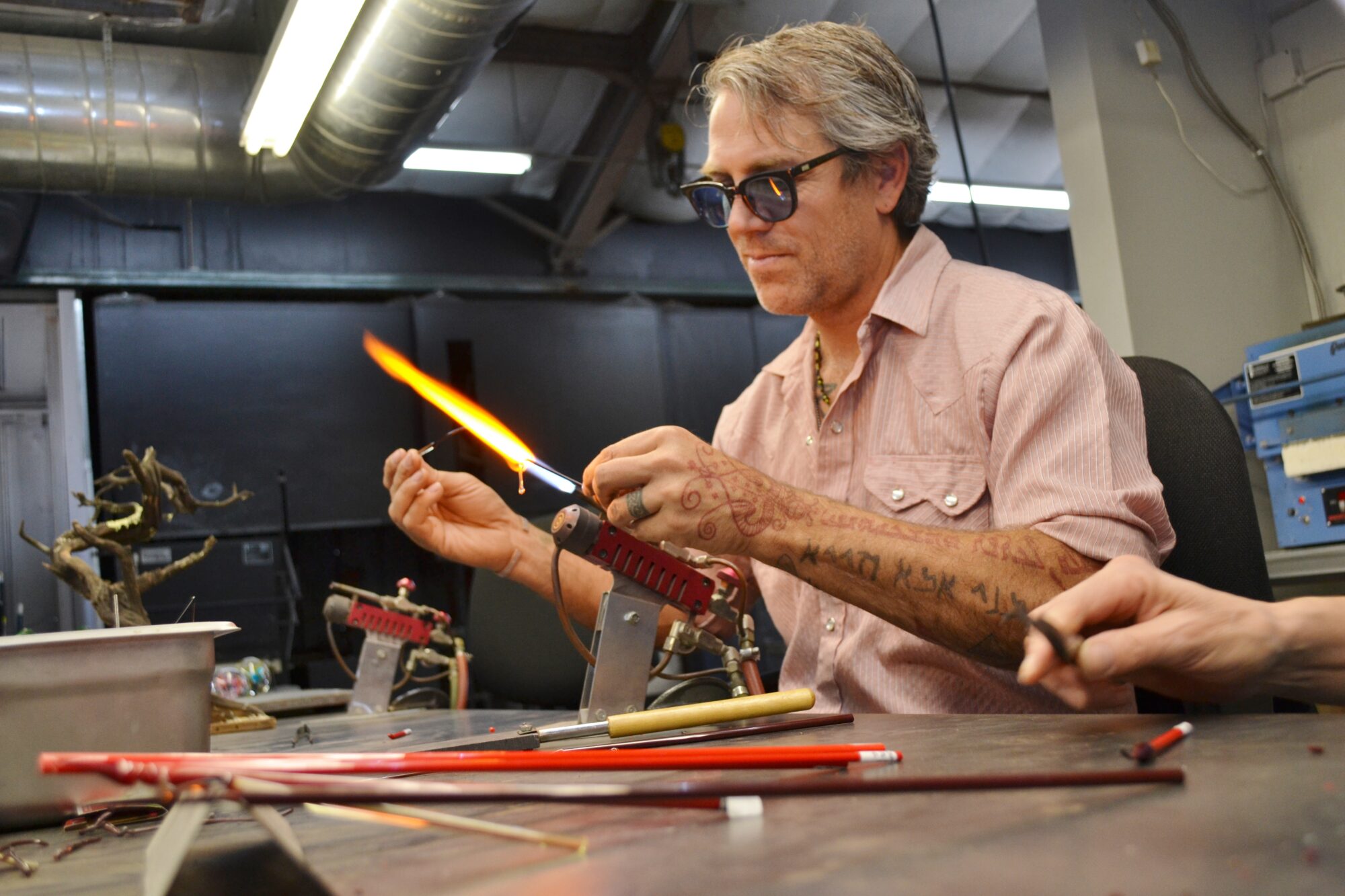Flame Shop
Flame Shop

There are two schools of thought with torchwork – one is soft glass or soda-lime glass. Beads have been made using soft glass since the 5th century BC. The second is hard glass, or borosilicate (Pyrex is a common trade name) – this glass is very clear and can take quick temperature changes.
The Flame Shop is where a torch is used to melt glass, beads, marbles, pendants, vases, goblets and, where sculptures are created.
Flame Shop Classes
We offer special workshops taught by talented community instructors in the flame shop. These classes have a limited number of seats and are offered throughout the semester. You must be at least 12 years old to sign up for a class.
Flame Shop Equipment
Our Flame Shop is equipped with eight Nortel Redmax burners, one Bethlehem Alpha, and one Bethlehem Bravo. There are three Paragon kilns of varying sizes, one Skutt kiln, plenty of hand tools, and an assortment of Borosilicate, 96 COE, and Effetre 104 glass. We sell borosilicate and 104 glass without tax.
We sell COE 104, 96 and 33 color and clear glass at SGS.
Flame Shop Rentals
As part of our educational mission, Sonoran Glass School’s studios are available for public use. Glass artists and students who seek to rent the studio must meet our qualifications. Rental sessions are a great opportunity to work on new ideas or finish projects. To inquire about rental availability, call us at 520-884-7814
Flame Shop Open Studio
See what other torch workers are up to! Collaborate with other artists or just enjoy the company of others while working on your project.
Use our Nortel Redmax burners, hand tools, and kilns. Propane/oxygen included, boro and soft glass available for purchase. You are also welcome to bring your own equipment, tools, and glass. See the Open Studio page for availability and more information.
Flame Shop Frequently Asked Questions
- The Flame Shop uses gas/oxygen torches to heat glass rods. The Hot Shop gathers glass from a furnace.
- The Flame Shop uses a small steel mandrel to make beads or the actual glass rod to melt the end to create a gather. The Hot Shop uses a long steel pipe called a blowpipe to gather glass.
- The Flame Shop uses flame from the torch as the heat source to melt and shape the glass. The Hot Shop has a furnace to heat the glass and a crucible that holds the molten glass.
- The Flame Shop makes smaller more detailed pieces and generally the artist or student works alone. The Hot Shop makes larger pieces that usually take a team.
Borosilicate glass consists of Silica, Boric Acid, Sodium Oxide and Aluminum Oxide. It is often easier to use than soft glass, since it is resistant to chemicals and temperature swings.
- Borosilicate glass is used for scientific lab ware, like test tubes.
- The original Pyrex was made out of Borosilicate. The new Pyrex, is made out of tempered soft glass.
- Borosilicate has a limited color selection, but new colors are being developed yearly.
- Borosilicate glass is relatively expensive.
- Borosilicate glass is mostly used for sculpture, cookware, marbles and pipes.
Soft glass is the most common and least expensive type of glass. Our Hot Shop also uses soft glass that is COE 96, though there are many types of soft glass used in the flame shop.
- Soft glass consists of Silica, Sodium Oxide and Calcium Oxide.
- Soft glass is chemically stable, and has a long working time. (You can work with it longer than, for example, Borosilicate glass.)
- Soft glass has a wide array of colors to choose from.
- Soft glass is mostly used for beads and sculptures.
Yes. You can either blow soft glass (using a small steel blow pipe), or borosilicate glass either by making your own tubing, or by purchasing pre-made tubing. Often goblets, hollow pendants or pipes are created in Flame Shops.
Size is up to you. With practice, you will be able attach smaller components in order to create a larger finished piece. Pieces can be as big as a person or as small and detailed as a fly.
Yes! We call those components. It’s important to use the same type of glass that you are fusing or blowing with, so there aren’t any compatibility issues.
Have a burning question we didn’t answer? Email us at info@sonoranglass.org or give us a call!
